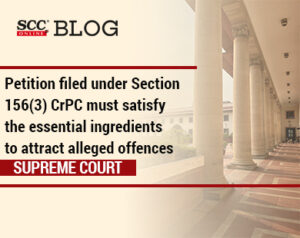Supreme Court: In an appeal against the judgment and order passed by the Calcutta High Court, wherein the Court has declined to exercise the jurisdiction under Section 482 of Code of Criminal Procedure, 1973 (‘CrPC’), holding that perusal of the case diary as also the materials appearing therefrom prima facie made out a case for investigation. Thus, the interim order granting stay of all further proceedings pursuant to the registration of the First Information Report (‘FIR’), was vacated, and the petition was dismissed, the division bench of Ajay Rastogi and C.T. Ravikumar*, JJ. said that this case invites invocation of the power under Section 482 CrPC to quash the FIR based on the direction of the Magistrate Court in the application and all further proceedings in pursuance thereof. Further, it held that permitting continuance of the criminal proceedings against the appellants in the given circumstances would result in abuse of the process of Court and in miscarriage of justice.
The Court said that there can be no doubt with respect to the position that jurisdiction under Section 482 CrPC is to be exercised with care and caution. This power is to be used sparingly and only for the purpose of preventing abuse of the process of any court or otherwise to secure ends of justice.
The Court after scanning the application filed by the respondent which was forwarded for investigation under Section 156(3) CrPC to consider whether the appellant is justified in taking up the contention that the allegations raised thereunder did not contain the ingredients to constitute the alleged offences or whether the respondent had made out a prima facie case for investigation, took note of the fact that the respondent has alleged commission of offences under Sections 323, 384, 406, 423, 467, 468, 420 and 120-B of the Penal Code, 1860 (‘IPC’) against the appellants.
It also said that to cause registration of an F.I.R. and consequential investigation based on the same, the petition filed under Section 156(3) CrPC must satisfy the essential ingredients to attract the alleged offences. Thus, the Court referred to the ingredients to constitute such offences and said that that the allegations are vague, and they did not carry the essential ingredients to constitute the alleged offences. There is absolutely no allegation in the complaint that the appellants had caused hurt on the respondent or had intentionally put the respondent in fear of injury either to himself or another or by putting him under such fear or injury, dishonestly induced him to deliver any property or valuable security. The same is the position with respect to the alleged offences punishable under Sections 406, 423, 467, 468, 420 and 120-B, IPC. Thus, the respondent had failed to make specific allegation against the appellants in respect of the aforesaid offences.
Further, it said that the dispute involved is essentially of a civil nature, and relying on Paramjeet Batra v. State of Uttarakhand, (2013) 11 SCC 673, said that when the respondent had already resorted to the available civil remedy and it is pending, the High Court would have quashed the criminal proceedings to prevent the abuse of the process of the Court.
The Court also said that as the respondent had already approached the jurisdictional civil court by instituting a civil suit and it is pending, there can be no doubt with respect to the fact that the attempt on the part of the respondent is to use the criminal proceedings as weapon of harassment against the appellants.
[Usha Chakraborty v. State of W.B., 2023 SCC OnLine SC 90, decided on 30-01-2023]
*Judgment by: Justice C.T. Ravikumar.
*Apoorva Goel, Editorial Assistant has reported this brief.

